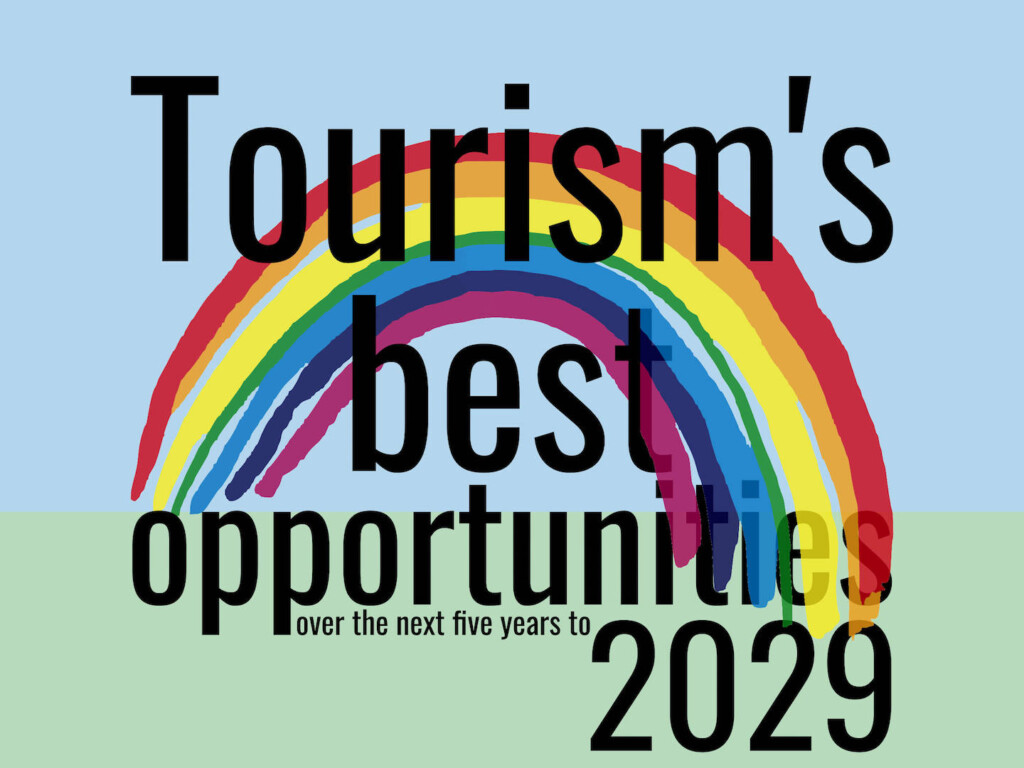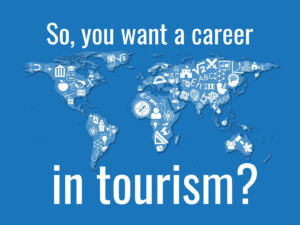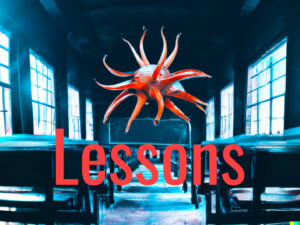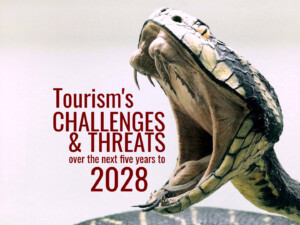In 2024, what are the best opportunities for tourism over the next five years?

Over the next five years, what is the best opportunity for travel & tourism where you work, or that you have identified through your research and study?
And what are the key strategies that your organisation, destination, or the industry at large should employ to take advantage of that opportunity?
It’s a “Good Tourism” Insight Bites question.
Your correspondent put the question to a range of travel & tourism stakeholders in the “GT” network, inviting emailed written responses of no more than 300 words.
Included in this “GT” Insight Bites compilation are four “GT” Insight BiteX contributions. BiteX (where ‘X’ is up to you) is an opportunity for any travel & tourism stakeholder to discuss anything they want (within reason) within the strict 300-word limit.
Bites menu
- In Rwanda: The Greater Virunga Transboundary Collaboration
- Technology … with care
- ‘Strong ambition’ climate action
- ‘Balanced tourism’ and social enterprises
- Opportunities for the most adaptive
- Leadership activated
- In Rwanda: ‘Significant strides’ in tourism development
- In Asia and the Pacific: What can PATA do?
- Sustainability niches
- In Rwanda: Favourable conditions
- In Kenya: Demand for sustainable, responsible tourism
- A growing interest in tackling food waste
- More active and involved communities
- “GT” Insight BiteX (‘X’ is up to you)
- BiteX: Pune’s pollution problems
- BiteX: ‘You cannot beat climage change, but …’
- BiteX: What do leaders have in common?
- BiteX: ‘Climate change blanches greenwashing’
- What do you think?
- Featured image (top of post)
- Previous “GT” Insight Bites
In Rwanda: The Greater Virunga Transboundary Collaboration
Greg Bakunzi, Founder, Red Rocks Initiative for Sustainable Development & Red Rocks Rwanda
In the forthcoming five years, the Greater Virunga Transboundary Collaboration stands out as a key driver for travel & tourism in the region, fostering collaboration between Rwanda and neighbouring countries.
This initiative holds immense promise for both bolstering tourism opportunities and advancing wildlife conservation efforts across borders. Joint endeavours stemming from this collaboration could lead to an expansion of tourism offerings.
Rwanda has made noteworthy strides in accommodation and infrastructure, providing diverse lodging options to cater to various preferences and budgets.
The growing demand for sustainable and eco-friendly accommodation and other facilities is expected to shape tourism development here, further contributing to environmental preservation and the opportunities available to local communities.
The next five years will spotlight the crucial role of community-based cultural tourism in leveraging the rich heritage of the region to fuel inclusive economic growth.
As collaborative efforts in nature- and community-based tourism unfold, Rwanda and the Virunga Transboundary region will further emerge as a premier travel destination.
To capitalise on the burgeoning opportunities, we at Red Rocks will leverage our status as a trailblazer in championing people-centric and destination-focused experiences.
Key strategies will include enhancing all our existing programmes, including the cultural events we organise to showcase our rich heritage.
Other initiatives will include:
- Community engagement in capacity building to empower local communities, ensuring a more equitable distribution of tourism benefits;
- Adopting and advocating for sustainable practices that align our cultural tourism offerings with eco-friendly community-based conservation efforts;
- Strategic partnerships, including in digital marketing;
- Advocating for high-quality transportation and tourism infrastructure that preserves the region’s cultural and environmental integrity; and
- Developing our own facilities to enhance the experience we offer our guests.
[Red Rocks is a valued “GT” Partner.]
Technology … with care
Saverio Francesco Bertolucci, Commercial Assistant, VDB Luxury Properties, Spain
For almost every stockholder in the market who owns a piece of a public (or private) hospitality company, the main opportunity to look for is the development and appropriate deployment of technology.
Software, data, and algorithms can help track results, attract clients, and grant socio-economic sustainability … if paired with efficient human knowledge and a good product on site.
In an industry that is probably the most human, customer-facing one, every tangible and interpersonal aspect of the hospitality business still needs to take precedence over technology.
Delegating everything to technology is likely the worst mistake a hotel or a real estate company could make; an opportunity turned into a crisis rather than the other way around.
Indeed, as I presented during my speech at TIS — Tourism Innovation Summit in Sevilla, technology offers a clear advantage in hyper-personalising engagement, boosting revenues, and providing the best products and services to specific categories of clients, but it should never be considered the sole saviour of a failing business.
‘Strong ambition’ climate action
Geoffrey Lipman, Creative Disruption Architect, SUNx Malta
During the past five years, with a small, smart team, we have had fun creating a framework at SUNx Malta for tourism communities to respond positively to the existential climate crisis.
Building on the vision of the late Maurice Strong, to act for a better future for our kids:
- We defined #ClimateFriendlyTravel as Paris 1.5 / SDG linked / Nature + and focused on Least Developed Countries and Small Island Developing States;
- We launched the world’s first postgraduate #ClimateFriendlyTravel Diploma with 100+ students trained as Strong Climate Champions;
- We created a UNFCCC-linked Registry to help companies and communities build Climate Action Plan;
- We launched Chapters in 50 developing countries this year, plus initiatives in Ukraine and Bali, Indonesia (we plan 40 more next year);
- We also just started three social enterprises:
- Climate Friendly Travel Club to engage tomorrow’s young travellers with rewards for positive climate behaviour;
- Climate Friendly Travel Services to help communities and companies create their Plan B; and
- Climate Friendly Travel Facility to raise blended finance for these initiatives.
With this action framework in place, and a new TPCC stocktake to guide us, we see the opportunity to build a ‘Strong ambition’ group of communities in the travel & tourism sector who seek to deliver on the nature-positive, SDG-oriented Paris 1.5 targets: Peaking greenhouse gas (GHG) emissions by 2025; cutting GHG emissions in half by 2030; and getting GHG emissions down to zero by 2050.
[SUNx Malta is a valued “GT” Partner.]
‘Balanced tourism’ and social enterprises
Jens Thraenhart, Founding Partner, Chameleon Strategies, Thailand
‘Balanced tourism’ driven by social enterprises presents the best opportunity for travel & tourism, particularly in the field of destination management.

This approach fosters sustainable, inclusive growth, reduces leakage, and promotes authentic experiences, which are increasingly sought after by environmentally-aware and socially-conscious modern travellers who make purchasing decisions that align with their values.
How?
- Balanced tourism focuses on the equitable distribution of tourism’s benefits among stakeholders; not only large corporations, but also communities, small businesses, and the environment. Channelling tourism revenues into communities ensures that economic benefits are more widely shared. More inclusive tourism counters destination mis-management that leads to overcrowding in some areas.
- Social enterprises offer a unique value proposition. Rooted in communities, and often with a strong commitment to preserving culture, the environment, and well-being, social enterprises are best positioned to offer authentic, culturally-rich experiences. Tourists gain a deeper, more respectful, and enriching understanding and experience of the destination.
- The digital transformation offers new tools for promoting balanced tourism. Digital tools also provide travellers with all the information they need to make decisions. Digital platforms can enhance visibility for small, local enterprises, facilitating direct engagement with travellers.
In conclusion, balanced tourism and social enterprises represent a future in which travel is not just about places, but about people and their stories. By adopting this approach, travel & tourism can drive positive change, ensuring that it remains vibrant, resilient, and beneficial for all in the years to come; that it truly is a force for good.
I recently launched www.BalancedTourism.com to highlight this opportunity. Its sister blog www.PurposePicks.com showcases my personal picks of the most impactful social enterprises in travel.
Opportunities for the most adaptive
Wolfgang Georg Arlt, CEO, COTRI (China Outbound Tourism Research Institute); Director, Meaningful Tourism Center, Germany
Over the next five years, the best way to take advantage of the opportunities arising for most travel, tourism, and service providers is to re-invent themselves in response to:
- Changing demand. More older people and young singles are travelling instead of traditional families. They are looking for authentic experiences and encounters with locals instead of just recreation.
- Artificial intelligence. AI is changing the world in the same way the internet changed it 25 years ago, with the crucial difference being that it is not just replacing tools (email for mail, Netflix for TV, Google for dictionary) but creating completely new tools (machine for man), and much faster.
- Climate change. Perhaps the biggest reason to adapt, climate change will threaten many business models and investments. It is nice to be environmentally-friendly, with labels and certificates, but this is like installing sprinklers and smoke detectors in a house that’s already on fire.
Many will have to adapt now to pre-empt change, especially as we experience the results of the climate catastrophe sooner than even the worst-case scenarios predicted.
For example, beach resorts threatened by flooding, heat waves, and jellyfish invasions will lose guests even if those events do not happen every year. The possibility will be enough to keep potential visitors away.
But there are opportunities in a crisis. Taking advantage of them will mean leveraging the first mover advantage. Repurpose a property or destination. Offer more indoor activities. Move the main tourism season. Cater to special interests. Reposition a hotel as a live-in museum or conference centre.
Turn the Belgian birthplace of Mr Sax into a year-round destination for saxophone fans with saxophone-themed events and a saxophone music academy …
Those who believe that a little greenwashing will be enough will be the losers.
Leadership activated
K Michael Haywood, Professor Emeritus, University of Guelph, Canada
Not surprising, in response to the previous question, most respondents identified the problems affecting and associated with tourism as being external to the everyday operations of visitor-serving enterprises.
Perplexing, though, was why so few ignored the realities facing small-to-medium sized operators, including many in the C‑suite, whose real-time attention is focused on the immediate present; on the pressing internal issues and events besetting their organisations and communities: Inflation, revenue depletion, value collapse, mounting debt, employee and citizenry unrest.
It’s as if no one takes an interest in the actual movers-and-shakers … no one interested in the pressures and problems associated with managing and leading … the obstacles (often self-imposed) preventing problem-resolution and desired outcomes and astonishing magnificence from being achieved.
Best intentions sidelined by imbedded biases, habits, and processes; the fear of failure or reprisal; the inability to identify alternatives; a perceived lack of hope, time, or the desire to collaborate … a failure to view tourism as a community-wide endeavour, how the success of individuals and enterprises is contingent on the success of the whole.
Indeed, what does it take to realise extraordinary outcomes, manage meaningful change, prepare to adapt or pivot for our communities’ sake, humanity’s sake?
To flesh out all the associated opportunities linked to resolving our problems, we need to be far more forthcoming if we are to understand and hope to expand the mindsets of leaders; those who bring opportunities to fruition.
To learn how, read “Inner Mastery, Outer Impact”.
As a pursuit towards progress, leadership needs to be inspired by a sense of noble purpose. Only then can we hope to achieve our collective goals, open our hearts and minds to new possibilities, and select the right actions …
Destinations-in-Action energised by leaders, everyone conscientiously in pursuit of opportunities, co-creating value meaningful for all.
In Rwanda: ‘Significant strides’ in tourism development
Rwaka Mabrise, Communications Officer, Red Rocks Initiative for Sustainable Development & Red Rocks Rwanda
Rwanda has been making significant strides in developing the tourism sector, which helps us at Red Rocks focus on eco-tourism, conservation, and cultural experiences.

Over the next five years, opportunities for the travel & tourism industry in Rwanda are many, including the growing awareness and popularity of gorilla trekking experiences in Volcanoes National Park in the north of Rwanda.
We are eager to strengthen and promote this activity to attract more tourists interested in wildlife conservation and unique primate experiences. We have been investing in eco-friendly initiatives to support our sustainability efforts.
Our commitment extends to cultural tourism in Nyakinama village, where we share Rwanda’s rich cultural heritage — traditional dances, music, food, local crafts, and more — through our community-based tourism projects.
Continued investments in transportation, accommodation, and other tourism-related infrastructure will open up new areas for exploration and tourism development within our country. Thus we are embracing new technologies for marketing, bookings, and enhancing the overall tourism experience. This includes the development of mobile apps, online booking platforms, and virtual experiences to attract and engage tourists.
[Red Rocks is a valued “GT” Partner.]
In Asia and the Pacific: What can PATA do?
Peter Semone, Chair, Pacific Asia Travel Association
As the Chair of the Pacific Asia Travel Association (PATA), of course I will tell you that the best opportunities for travel & tourism in the medium to long term are in Asia and the Pacific, which are living museums; kaleidoscopes of the most unique and precious cultures and ecosystems known to mankind.
The PATA region’s supply of tourism products and services is unmatched for luxury, authenticity, and diversity.
From a demand perspective, it’s a no brainer. Asia Pacific is an epicentre of demographics with more than 55% (4.32 billion) of the global population living inside the Yuxi Circle; a 4,000-km radius circle centred on the small town of Yuxi in southwestern China’s Yunnan Province.
For those reasons, and many more, an investment in Asia Pacific is a wise bet.
What can PATA do to take advantage of these opportunities?
- PATA needs to become a knowledge organisation that identifies tourism trends. We need to work with strategic partners to collect and aggregate data from multiple sources.
- PATA needs to produce position papers as knowledge products that stimulate debate among and action by governments, the private sector, and civil society.
- PATA needs to speak out on opportunities, threats, and challenges through engagement with the media.
- PATA needs to organise thematic events that attract a broad cross section of tourism stakeholders, similar to the PATA events of the 1970s, 80s, and 90s.
- PATA needs to build capacity in our region through targeted education and training programs geared at national tourism organisations and industry, particularly micro and small enterprises. (Our long and proud history of capacity building in the PATA region should not be forgotten.)
I think with these elements, PATA can regain its authority as ‘the Voice’ of the Pacific Asia region’s tourism industry.
Sustainability niches
Ed Jackiewicz, Professor, California State University, Northridge, USA
The dismal prognoses we often hear about for tourism recklessly overlook much of the innovation in the industry, both from producers and consumers.
One potential bright spot from the pandemic is that it provided an opportunity, whether consciously or subconsciously, to pause and reflect on our lifestyles and the role of our tourism and leisure activities within them.
The trends arising have implications for how places adjust.
In a “GT” Insight from last year, my colleague and I highlighted the small city of Bend, Oregon and its appeal to telecommuters and digital nomads who wish to integrate recreational activities into their daily routine in pursuit of a ‘permanent vacation’.
Places like Bend, with its vast ‘naturescapes’ and ‘adventurescapes’, attract this long-stay market as well as mostly younger outdoor enthusiasts more generally, thus the protection of the environment becomes critical for the sustainability of the destination.
Visit Bend, the city’s destination marketing organisation (DMO), plays an increasingly vital role in promoting environmental sustainability.
It was recently recognised as the Leave No Trace Destination of the Year for its integration of the Leave No Trace principles into the marketing of the region; promoting those principles to Central Oregon’s local residents as well as its 4.5 million visitors.
This is just one example of an organisation steering the future of tourism in a positive direction. As other tourism ‘niches’, such as gastro tourism, volunteer tourism, and so many others, continue to evolve, more targeted and focused sustainability campaigns within those areas of interest have the potential for positive outcomes moving forward.
In Rwanda: Favourable conditions
Roger Irakoze, tour guide and wildlife filmmaker, Rwanda
Red Rocks is a community-based organisation that focuses on community development through cultural tourism.
Red Rocks is two organisations. One is Red Rocks Initiatives for Sustainable Development which is a non-profit organisation. The other is Red Rocks Rwanda which is an intercultural centre and social enterprise
The best opportunities for Red Rocks over the next five years come out of the favourable conditions in which we operate:
- Political stability: Rwanda is politically stable and one of the safest countries in Africa.
- Good tourism policy: Rwanda’s government has a good plan for the future of tourism in general.
- Visit Rwanda marketing campaign: Rwanda’s government has put a lot of effort into advertising and promoting Rwanda and its tourism industry.
- Cultural tourism is trending: Cultural tourism awareness is growing and many more people are motivated to travel to explore the heritage and culture of Rwanda, which advantages Red Rocks.
- Increased well-being of mountain gorillas: Growing awareness that the mountain gorillas of Rwanda are well taken care of increases the number of people who wish to see them. Red Rocks is not far from Volcanoes National Park, which is where our mountain gorillas live.
- Open gates for foreign investors: The presence of foreign investors in Rwanda is another source of visitors to Red Rocks, and they may want to forge partnerships.
The key strategies to employ to take the advantage of the opportunities include:
- Excellent customer service: Treating your visitors well leads to repeat visits and/or positive word-of-mouth.
- Strategic marketing: The better you advertise your products and services, the more they get to be known by the right people.
- Innovation: New products or features increases the pool of potential customers.
- Differentiation: Offer something unique.
[Red Rocks is a valued “GT” Partner.]
In Kenya: Demand for sustainable, responsible tourism
Edwin Magio, PhD Research Student, Leeds Beckett University, UK
There has been a significant increase in awareness and demand for sustainable and responsible tourism worldwide.
Kenya has the potential to be an ideal destination for tourists seeking sustainable and responsible tourism destinations.
The key to realising this potential lies in mainstreaming local communities and community-based tourism. This can to create a ‘win-win’ wherein tourism becomes a force for positive social and economic change in local communities while preserving Kenya’s rich biodiversity and culture for future generations.
A community-based tourism approach relies on three strategies:
- Capacity building entails empowering local communities with the knowledge and skills necessary to actively participate in and manage tourism initiatives. This may include training programs in business planning, product development, marketing, and entrepreneurship.
- Partnerships play an important role in fostering collaboration between the tourism industry and local communities. Partnership with community groups and businesses can create a symbiotic relationship, ensuring that the benefits of tourism are shared more equitably.
- Promotion to raise awareness of community-based tourism products is equally important. Local and international marketing campaigns should reflect the authentic experiences that awaits tourists and the positive impact their trips can have on the local communities.
By integrating these strategies, Kenya can develop a community-based tourism model that prioritises sustainability, community empowerment, and biodiversity conservation, and unlocks the hidden potential of the travel & tourism industry to be a driving force for positive change.
A growing interest in tackling food waste
Rubina Srikureja, Senior Manager of Operations, LightBlue Consulting
When people look at the data around food waste, they are stunned.

The scale of the food waste problem is of increasing interest globally, and more people are integrating systems to tackle the issue from the core; by preventing it.
Reaching out to different institutions across Asia and around the world is a huge opportunity for us at LightBlue Consulting to raise awareness of the issue of food waste.
We occasionally offer pro-bono free courses to NGO schools to help raise awareness of food waste. Providing training to schools helps to educate the next generation.
We’ve received great feedback from professors, university coordinators, and students who have taken our online food waste prevention course.
We think that anything that raises awareness of food waste is crucial to keeping our planet habitable for future generations. Therefore, we would urge travel & tourism operators to join us in fighting food waste to make a real difference in the world.
More active and involved communities
Jonathon Day, Associate Professor at Purdue University, Indiana, USA
Last year Skift identified a trend towards communities taking a more active role in tourism development.
This trend provides a great opportunity for tourism practitioners to truly understand what tourism activities contribute to improving quality of life in destination communities.
Our industry needs to build our capacity for hearing community feedback and integrating it into our planning.
There are models out there we can learn from. Town planners engage all the time. And even within tourism there are places that do it well. The recent DMOcracy project undertaken by Miles Partnership highlights some great examples.
Moving to a ‘locals first’ tourism model brings the purpose of (sustainable) tourism development into focus.
Why promote tourism? Ultimately the answer must be to improve the quality of life in destination communities.
And for DMOs the next question is: “Who do we work for?” The answer has to be the people of the destination, not hoteliers, event organisers, or tourism operators.
Remembering our purpose — the why of our work — (re)frames tourism promotion and development appropriately.
Recognising that change — and working effectively with the community — is an exciting opportunity for the coming years.
“GT” Insight BiteX (‘X’ is up to you)
The “Good Tourism” Blog offers a great opportunity to any travel & tourism stakeholder who wishes to express themself in writing for the benefit of “GT’s” thoughtful and open-minded readers. To feature in the next “GT” Insight Bite compilation, send no more than 300 words (300 words or fewer (</=300 words)) on any tourism-related idea or concern you may have. “GT’s” publisher will personally help with basic copy editing, so don’t by shy if you lack confidence in writing English.
Send your “GT” Insight Bite and picture to GoodTourism@gmail.com
BiteX: Pune’s pollution problems
Sandip Sahebrao Tapkir, Principal, Swami Samarth Maharashtra Institute of Hotel Management & Catering Technology, India
Over the decades, tourism has faced many challenges and threats, both natural and man-made. It is a cycle. Every century we find new ones in their many forms.

Yet the tourism industry has kept progressing and overcoming these challenges and threats and is now positioned to play a major roles in attaining the UN’s sustainable development goals.
I live in Pune, Maharashtra, India. The topic for this “GT” Insight Bite is my response to “What are tourism’s biggest challenges & threats over the next five years to 2028?”
Pollution is the single biggest challenge and threat to mankind, the environment, and all the creatures. And it is the biggest challenge and threat to tourism in my locality.
Most of the water bodies like rivers, underground water sources, lakes, and ponds are highly polluted due to industrialisation, with drainage and untreated sewage water released to them.
Pollution of all kinds — water, air, noise, land — and at all levels is the biggest challenge and threat to sustaining good tourism at my location.
The overuse of plastics and the huge numbers of private vehicles that emit greenhouse gases add to the pollution problem.
Key actions:
- Ban plastic use;
- Funding and attention to these issues by public and private bodies;
- Limit private vehicle use and shift to electric vehicles;
- Restore and protect water sources;
- Public awareness campaigns.
I am sure that people are now realising the importance of protecting destinations. We will see good results if we take action today; as a joint venture among all the stakeholders in society.
BiteX: ‘You cannot beat climage change, but …’
Wolfgang Georg Arlt, CEO, COTRI (China Outbound Tourism Research Institute); Director, Meaningful Tourism Center, Germany
The facts: 2023 was the hottest year since records began in 1880, with global average temperatures at 1.46C above pre-industrial levels.
COP28 failed. COP29 in Baku this year is not promising any progress either. Chairman Xi Jinping did not even mention climate change in his long New Year speech for 2024. None of the 17 SDGs will be achieved by 2030 according to current data.
Climate change will destroy business models for many beach and skiing resorts, national parks, city hotels, etc. The term ‘tourism hotspot’ will acquire a new meaning.
The key strategy for companies and destinations engaged with tourism and hospitality is, firstly, to produce a realistic forecast for the possible effects of climate change in the next five years. ‘Realistic’ means assuming the worst-case scenario instead of the “Paris 2015 goals can still be achieved” wishful thinking.
The effects analysed should be based on KPIs for all six main stakeholders of the Meaningful Tourism paradigm: Tourists, Host communities, Employees of Service Provider, Service Providers, Governments, and the Environment.
The second step is to develop a new business model using, again, Meaningful Tourism tools, repositioning existing structures and changing investment decisions.
Chairman Xi stated: “We will continue to act on the principle of seeking progress while maintaining stability, promoting stability through progress, and establishing the new before abolishing the old.”
For the global tourism industry, it is probably better to stay with Joseph Schumpeter: “Situations emerge in the process of creative destruction in which many firms may have to perish that nevertheless would be able to live on vigorously and usefully if they could weather a particular storm.”
You cannot beat climate change, but you can beat your competitors by reacting faster.
BiteX: What do leaders have in common?
K Michael Haywood, Professor Emeritus, University of Guelph, Canada
Leaders, each in their own contexts, are consumed with unleashing potential; their own and that of the people they lead or serve.
During optimistic times, they strive to rely on reason and bring about positive change.
However, when faced with uncertainty and complexity in today’s pessimistic times, a leader’s missteps can destroy institutional value and reputation and lead to their replacement.
Failing as change leaders is an anathema. But old habits, formal processes, self-doubt, lack of experience, existing reward systems, professional standards, the status quo, and difficulty leaving comfort zones can prevent leaders from achieving the extraordinary; especially when inattention to bad decisions or the nuance of consequentialism persists.
Drawing from John Kotter’s framework, the leader’s job is said to require:
- Articulating a common vision,
- Aligning people around it, and
- Motivating them to execute it.
What actually makes or breaks a leader is not how well they drive an agenda, but how they react in real time to events they cannot predict.
This makes me wonder to what extent is the fundamental state of leadership common to leaders. Do leaders demonstrate leadership-in-flow? Do they possess a centeredness that draws on energies they have or are infused by:
- A clearly articulated purpose;
- A commitment to a noble cause;
- An inner calmness and positivity;
- Self-realisation and intuitiveness; and
- A curiosity of, and receptivity to, others needs and points of view.
Or is the commonality among leaders a feeling of powerlessness and frustration?
Not if they see fit to:
- Revise their result-orientations;
- Rebuild trust;
- Persuade people to make good things great;
- Create and capture value meaningful for all;
- Reduce the friction undermining productivity and creativity;
- Adopt new progress principles;
- Circumvent existential threats; and
- Encourage everyone to build success upon success.
BiteX: ‘Climate change blanches greenwashing’
Herb Hiller, Writer & Publisher, The Climate Traveler, USA
As quickly as possible, tourism must advance the role of science in general and climatology in particular into destination policy making.
It must also strengthen science-led strategies toward climate action that preserve leisure and business travel free of further travel trade greenwashing.
Tourism in its favoured mode as expensive long distance travel by air already freights every next trip with a more globe-threatening discharge of greenhouse gas emissions.
The travel question for 2024 that looms for every travel advisor is how their clients can get home fast if only to evacuate for the next once-in-a-100-year fire, hurricane, or flood.
This doesn’t mean that people can’t continue to keep travelling and keep spending lavishly for fair value so long as luxury is locally inspired. The trick is travel by the least polluting means possible that combines commitment to climate action with immersive local interpretation.
Nor should we precisely blame apex greenwashers like fees-concealing hotels or cruise ship companies that refuse to compensate ports of call fairly for passenger impacts. Their leaders were educated in a system that rewards such behaviour.
We should instead look forward to action that follows a recent forecast by Miles Partnership and Future Partners that in the next five years climate change will skew travel toward destinations closer to home (59% say so, up from 56% two years ago). It will also affect how people get around at their destinations, e.g., by taking more public transportation and fewer flights.
Or as OAG Aviation puts things, citing Skift, Expedia, and the OTA start-up Viatu: “On top of the ever-increasing demand for more sustainable travel options, people are specifically asking for greater transparency and education on this matter than ever before. This is a trend that is found in almost all of the latest traveller surveys.”
What do you think?
In a comment below share your own thoughts about the best opportunities for travel & tourism over the next five years. (SIGN IN or REGISTER first. After signing in you will need to refresh this page to see the comments section.)
Or write a “GT” Insight or “GT” Insight Bite of your own. The “Good Tourism” Blog welcomes diversity of opinion and perspective about travel & tourism, because travel & tourism is everyone’s business.
This is an open invitation to travel & tourism stakeholders from any background to share their thoughts in plain English with a global industry audience.
“GT” doesn’t judge. “GT” publishes. “GT” is where free thought travels.
If you think the tourism media landscape is better with “GT” in it, then please …
Featured image (top of post)
What are the travel & tourism industry’s best opportunities over the next five years to 2029? Rainbow image by Clker-Free-Vector-Images (CC0) via Pixabay.
Previous “GT” Insight Bites
- Tourism’s biggest challenges & threats over the next five years to 2028
- On empowerment, promotion, and the power of expression
- On enrichment, repatriation, the double-edged blade, and war
- On tourism technology, progress, and local benefit-sharing
- Hey, travel & tourism, are you ‘neocolonialist’?
- Who’s the new boss? Asia Pacific tourism industry association seeks leader
- ‘The hospitality industry offers a great career.’ Really?
- Cruise ships: Blessing or blight?
- Tourist vs traveller: What’s the difference?
- The heads of finance, operations, and PR walk into their boss’s office …
- Yes, Tourism Minister
- What are tourism’s biggest challenges & threats over the next five years?
- ‘Tourism is built on the backbone of white supremacy’. What do you think?
- Really, what’s the difference? ‘Sustainable tourism’ vs ‘regenerative tourism’
- Want a career in tourism? Important things you should know
- Diverse perspectives on travel & tourism and a fairer world
- Diverse perspectives on economic degrowth and tourism
- Diverse perspectives on visitor dispersion
















